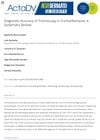56 citations,
December 2010 in “The journal of investigative dermatology/Journal of investigative dermatology” Hair follicle cells age faster and lose pigment due to less catalase, causing hair to turn gray.
52 citations,
April 2016 in “Journal of the American Academy of Dermatology” Certain black hairstyling practices increase the risk of traction alopecia, requiring better management and education.
48 citations,
April 2021 in “Journal of the American Academy of Dermatology” Topical corticosteroids are the best initial treatment for children's alopecia areata.
44 citations,
July 2013 in “Journal of the American Academy of Dermatology” Poliosis circumscripta is a patch of white hair caused by lack of melanin, linked to genetic and acquired conditions.
 40 citations,
February 2012 in “Dermatology Online Journal”
40 citations,
February 2012 in “Dermatology Online Journal” Lasers might help hair growth in some alopecia cases, but more research is needed to confirm their effectiveness and safety.
 30 citations,
September 2020 in “Journal of Patient-Reported Outcomes”
30 citations,
September 2020 in “Journal of Patient-Reported Outcomes” Alopecia Areata (AA) causes significant emotional distress, including feelings of embarrassment, depression, and anxiety, and impacts social interactions and daily activities.
26 citations,
October 2016 in “American journal of clinical dermatology” New treatments like JAK inhibitors show promise for reversing alopecia areata.
26 citations,
February 2015 in “Pediatric blood & cancer” Targeted anticancer therapies in children often cause skin side effects like rash and dry skin.
 25 citations,
June 2020 in “Dermatology practical & conceptual”
25 citations,
June 2020 in “Dermatology practical & conceptual” Scalp cooling can help prevent hair loss from chemotherapy, but treatment should be tailored to the individual and more research is needed.
23 citations,
February 2021 in “Dermatologic therapy” Some treatments like pentoxifylline with topical corticosteroids might work for alopecia areata, but more research is needed to find the best one.
23 citations,
March 2017 in “JAAD case reports” The document suggests a possible link between FAM111B gene mutations and increased cancer risk, particularly pancreatic cancer.
 20 citations,
March 2023 in “American Journal of Clinical Dermatology”
20 citations,
March 2023 in “American Journal of Clinical Dermatology” Baricitinib improved severe hair loss in adults over 52 weeks and was safe to use.
17 citations,
June 2020 in “Anais brasileiros de dermatologia/Anais Brasileiros de Dermatologia” Scalp cooling is an effective way to prevent hair loss from chemotherapy.
15 citations,
January 2015 in “Dermatitis” Topical immunotherapy is the best treatment for severe alopecia areata.
14 citations,
June 2020 in “BMC genomics” The study identified key genes that regulate the growth cycle of cashmere in goats, which could help improve breeding strategies.
12 citations,
May 2015 in “Journal of the National Comprehensive Cancer Network” Doctors should actively prevent and treat skin side effects in cancer patients to keep them on the best medication and reduce discomfort.
 10 citations,
January 2023 in “Journal of the European Academy of Dermatology and Venereology”
10 citations,
January 2023 in “Journal of the European Academy of Dermatology and Venereology” Alopecia areata greatly affects people's life quality, mental health, and work life.
10 citations,
January 2021 in “Annals of dermatology/Annals of Dermatology” Nivolumab can cause hair loss as a rare side effect.
 8 citations,
June 2021 in “Acta dermato-venereologica”
8 citations,
June 2021 in “Acta dermato-venereologica” Trichoscopy is a reliable method for diagnosing hair-pulling disorder.
 7 citations,
August 2023 in “Journal of the American Academy of Dermatology”
7 citations,
August 2023 in “Journal of the American Academy of Dermatology” JAK inhibitors offer new hope for treating severe alopecia areata.
 6 citations,
May 2023 in “Drugs”
6 citations,
May 2023 in “Drugs” Baricitinib helps regrow hair in adults with severe alopecia better than a placebo and is approved for treatment, but long-term effects are still unknown.
5 citations,
February 2022 in “Molecular genetics & genomic medicine” New gene variants linked to a rare inherited hair loss disorder were found in three Chinese families.
5 citations,
February 2017 in “Cochrane library” There is not enough evidence to know if different ways of putting in eye drops for glaucoma work better than others.
 4 citations,
February 2022 in “JAAD case reports”
4 citations,
February 2022 in “JAAD case reports” The document concludes that low-dose oral minoxidil successfully regrew hair in a patient with permanent hair loss after chemotherapy and stem cell transplant.
 4 citations,
January 2020 in “Skin appendage disorders”
4 citations,
January 2020 in “Skin appendage disorders” A woman with an unusual pattern of hair loss was confirmed to have Frontal Fibrosing Alopecia and treated with specific medications.
 3 citations,
October 2021 in “Journal of Cosmetic Dermatology”
3 citations,
October 2021 in “Journal of Cosmetic Dermatology” Trichoscopy helps tell apart Frontal Fibrosing Alopecia and Lichen planopilaris by showing different hair and scalp features.
3 citations,
August 2019 in “Journal of Cancer Research and Therapeutics” Cetuximab can cause unusual hair growth and hair loss.
 3 citations,
July 2019 in “Supportive Care in Cancer”
3 citations,
July 2019 in “Supportive Care in Cancer” The lotion CG428 did not show effectiveness in treating permanent hair loss in breast cancer survivors.
 2 citations,
July 2022 in “Journal of The American Academy of Dermatology”
2 citations,
July 2022 in “Journal of The American Academy of Dermatology” People with alopecia who are more resilient tend to feel less stressed.
2 citations,
July 2014 in “Journal of pharmacology and pharmacotherapeutics” A woman got unwanted hair growth on her face from using bimatoprost eyedrops for glaucoma.












